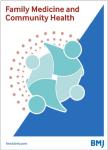Stool DNA-based versus colonoscopy-based colorectal cancer screening: Patient perceptions and preferences
作者机构:Department of Family Medicine and Community HealthCase Western Reserve University School of Medicine11001 Cedar AvenueSuite 200ClevelandOH 44106USA Division of GastroenterologyUniversity Hospitals Case Medical Center11100 Euclid AvenueClevelandOH 44106USA Case Comprehensive Cancer CenterCase Western Reserve University School of Medicine10900 Euclid AvenueClevelandOH 44106USA Swetland Center for Environmental HealthCase Western Reserve University11000 Cedar AvenueSuite 402ClevelandOH 44106USA
出 版 物:《Family Medicine and Community Health》 (家庭医学与社区卫生(英文))
年 卷 期:2015年第3卷第3期
页 面:2-8页
学科分类:1004[医学-公共卫生与预防医学(可授医学、理学学位)] 1002[医学-临床医学] 1001[医学-基础医学(可授医学、理学学位)] 100214[医学-肿瘤学] 10[医学]
基 金:the National Cancer Institute(R01 CA136726 and U01CA181770 to L.Li and P50CA50964 to L.Li and G.Cooper)
主 题:Colon cancer screening race stool DNA test patient perceptions
摘 要:Objective:Stool DNA(sDNA)tests offer a noninvasive form of colon cancer screening for pa-tients,and although the test is expected to increase uptake of colon cancer screening,it is unknown if patients’perceptions of the sDNA test differ according to race and other patient ***:We conducted a self-administered survey of patients undergoing both a colonoscopy and an sDNA test to evaluate perceptions of sDNA ***:Of the 613 participants who were sent surveys,423 responded(69%response rate).Respondents self-identified as African American(n=127,30%),Caucasian(n=284,67%),and other ethnicity(n=12,3%).In general,participants found the sDNA test more suitable than a colonos-copy(n=309,75%).In univariate analyses,a higher percentage of Caucasians as compared with African Americans found the sDNA test more suitable than a colonoscopy(89%vs.76%,p0.01),and more Caucasians than African Americans preferred the sDNA test(43%vs.32%,p0.05).Ad-justment for covariates reduced these racial differences to no significance.A family history of colo-rectal cancer remains a significant factor for patient’s preferences for screening regardless of ***:Our study shows no racial differences in the perception of and preference for sDNA testing for colon *** to increase the uptake of sDNA testing may help reduce racial disparities in colorectal cancer.



